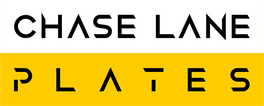What Are Tinted Number Plates and Are They Legal?
In the world of vehicle customisation, it’s often the little touches that make a car stand out. One such detail that’s been gaining attention—especially among car enthusiasts—is the tinted number plate. But what exactly are tinted number plates, and are they legal in the UK? Can you request them to be made for your car, and why do some people opt for them in the first place?
In this article, we’ll explore everything you need to know about tinted plates, including their use, legality, and some interesting facts about both tinted and show plates.
What Are Tinted Number Plates?
Tinted number plates are vehicle registration plates that have a smoky, darkened, or shaded appearance, usually created by adding a tinted acrylic layer over the characters or the entire plate. This creates a sleek, modern, or stealthy look, often matching a car’s darker styling theme—such as blacked-out trim, tinted windows, or matte paint finishes.
These plates may also be combined with 3D gel or 4D acrylic characters, creating a bold and layered effect that enhances the visual depth of the plate.
Are Tinted Number Plates Legal in the UK?
In short: No, tinted number plates are not legal for road use in the UK.
According to the DVLA and British Standards regulations (BS AU 145e), number plates must meet the following criteria to be road legal:
- Background must be white (front) and yellow (rear).
- Characters must be in solid black, without any effects, colouring, or tint.
- The plate must be fully reflective, with no overlays or filters.
- Characters must be easily readable by humans and ANPR (Automatic Number Plate Recognition) systems.
Tinting the plate—even slightly—reduces contrast and reflectivity, making it harder for cameras and law enforcement to read the registration. This violates UK road regulations and can result in penalties.
So, while tinted plates might look great, they are not legal for on-road vehicles, regardless of how subtle the tint may be.
Why Do People Use Tinted Number Plates?
Despite their illegality for road use, tinted number plates are still popular—especially in car shows, track days, and among vehicle modifiers. Here are a few reasons why:
-
Aesthetic Appeal: Tinted plates give vehicles a stealthy, uniform look, especially when paired with dark paintwork or aftermarket modifications.
-
Show Use: Many owners display tinted plates at car meets, exhibitions, or private events, where they’re not being used on public roads.
-
Photography and Social Media: Car photographers or influencers may use tinted plates for photo shoots, where the visual impact takes precedence over legality.
-
Privacy: Some people use tinted or show plates temporarily to obscure their registration when posting online, attending meets, or selling a vehicle.
Do the DVLA Approve Tinted Plates?
No—the DVLA does not approve the use of tinted, smoked, or coloured number plates for any form of road use.
The DVLA’s official stance is clear: all number plates must conform to BS AU 145e standards, including strict rules around visibility, font, spacing, reflectivity, and contrast. Plates that deviate from these standards—such as tinted or stylised plates—are considered non-compliant.
If you're caught using tinted plates on public roads, you risk:
- A £100 fixed penalty notice
- An MOT failure
- Potential seizure of your plate
- Having your registration number withdrawn by the DVLA
Can You Ask for Tinted Number Plates to Be Made?
You can technically request tinted plates from a custom plate supplier, but they must clearly inform you that the plates are for show use only and not road legal. Many legitimate suppliers label these as “show plates” or “off-road use only”.
Some customisers even offer additional effects, such as:
- Tinted acrylic overlays
- Carbon fibre-style backgrounds
- Coloured gels or 4D effects
- Custom fonts or logos
These designs may look great on a car parked at a show or on display in a showroom, but they should never be used on UK roads. Responsible plate suppliers will require proof of ownership and ID and make the distinction between road-legal and show plates very clear.
When Would You Add Tinted Number Plates to a Vehicle?
While not legal for everyday use, there are some scenarios where tinted plates are appropriate:
-
Car Shows and Meets
Tinted plates are popular at car shows, where visual styling is key and the vehicle isn’t being driven on public roads.
-
Track Days
For vehicles only used on private tracks or events, show plates offer the freedom to customise without breaking road laws.
-
Photography and Advertising
When promoting a car brand, YouTube channel, or detailing business, tinted plates can contribute to a stronger visual identity.
-
Display Vehicles
Cars used in exhibitions or showrooms may have tinted or branded plates for a sleek, professional finish.
Just remember to swap them out for legal plates before hitting the road.
Interesting Facts About Tinted and Show Number Plates
-
ANPR Systems Can’t Read Tinted Plates
Even a light tint can interfere with camera systems used by police and toll roads, making them ineffective and illegal.
-
Tinted Plates Can Void Insurance
Using non-legal plates can be considered a vehicle modification—if undeclared, it might invalidate your insurance.
-
DVLA Inspections Can Be Triggered by ANPR Alerts
Vehicles regularly spotted with unreadable plates may be flagged for investigation.
-
Show Plates Can Be Customised More Freely
Since they’re not for road use, show plates can include names, logos, custom fonts, slogans, or even different colours.
-
Some Countries Do Allow Tinted Plates
In parts of the US and Asia, tinted or stylised plates are more widely accepted, although UK vehicles must follow DVLA rules regardless of where they travel.
-
“Stealth Plates” Are a Growing Trend
Stealth-themed vehicles often use black badges, dark wheels, and tinted plates (off-road only) for a unified aesthetic.
Final Thoughts: Tinted Plates—Cool But Controversial
Tinted number plates can give your vehicle a seriously cool edge, especially when matched with dark styling or 4D lettering. However, the legal limitations in the UK are strict, and for good reason—number plates are crucial for safety, security, and law enforcement.
If you’re going for that stealthy look, save tinted plates for the show floor, not the street. Always keep a road-legal set on hand, and ensure you switch them over when driving on public roads.
In the world of car mods, it’s all about balance: look good, but stay legal.


